De Engelse dichteres en schrijfster Edith Sitwell werd geboren op 7 september 1887 in Scarborough. Zie ook mijn blog van 7 september 2008 en ook mijn blog van 7 september 2009 en ook mijn blog van 7 september 2010.
Clowns’ Houses
BENEATH the flat and paper sky
The sun, a demon’s eye,
Glowed through the air, that mask of glass;
All wand’ring sounds that pass
Seemed out of tune, as if the light
Were fiddle-strings pulled tight.
The market-square with spire and bell
Clanged out the hour in Hell;
The busy chatter of the heat
Shrilled like a parakeet;
And shuddering at the noonday light
The dust lay dead and white
As powder on a mummy’s face,
Or fawned with simian grace
Round booths with many a hard bright toy
And wooden brittle joy:
The cap and bells of Time the Clown
That, jangling, whistled down
Young cherubs hidden in the guise
Of every bird that flies;
And star-bright masks for youth to wear,
Lest any dream that fare
–Bright pilgrim–past our ken, should see
Hints of Reality.
Upon the sharp-set grass, shrill-green,
Tall trees like rattles lean,
And jangle sharp and dissily;
But when night falls they sign
Till Pierrot moon steals slyly in,
His face more white than sin,
Black-masked, and with cool touch lays bare
Each cherry, plum, and pear.
Then underneath the veiled eyes
Of houses, darkness lies–
Tall houses; like a hopeless prayer
They cleave the sly dumb air.
Blind are those houses, paper-thin
Old shadows hid therein,
With sly and crazy movements creep
Like marionettes, and weep.
Tall windows show Infinity;
And, hard reality,
The candles weep and pry and dance
Like lives mocked at by Chance.
The rooms are vast as Sleep within;
When once I ventured in,
Chill Silence, like a surging sea,
Slowly enveloped me.
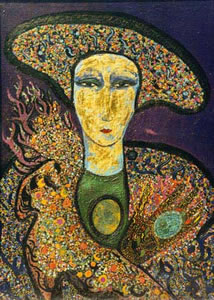
Edith Sitwell (7 september 1887 – 9 december 1964)
Portret door Stanley Lench, 1960
De Oostenrijkse dichter en schrijver Michael Guttenbrunner werd geboren op 7 september 1919 in Altenhofen. Zie ook mijn blog van 7 september 2008 en ook mijn blog van 7 september 2009 en ook mijn blog van 7 september 2010.
Der Justizpalast brennt
Der Justizpalast brennt.
Blindlings prügelnd und schießend
wildert die Polizei durch die Stadt,
trifft Waffenlose und Fliehende
und viele, die nicht wissen, was geschieht,
und streckt sie nieder. Der Asphalt
ist mit Leichen besät
Da lässt ein Mann, Karl Kraus,
ein Plakat anschlagen.
Er fordert den Polizeipräsidenten auf,
abzutreten, er beschuldigt ihn
der Blutschuld und schweigt nicht.
Doch jener, an seinem Sessel klebend,
nahm das Ehrendoktorat.
Er war berufen, des Untergangs Stufen
Er war berufen,
des Untergangs Stufen
noch einzuseifen
und sich drauf zu versteifen,
alles noch zu retten.
Das Volk, teils in Ketten
und teils in Waffen,
illegal und offiziell;
doch niemand gerüstet,
ihm Luft zu schaffen
zum letzten Appell. –
Ach, wenn ihr wüsstet,
was das war:
Das Mundvoll Österreich
beim Großen Zapfenstreich
im Achtunddreißigerjahr!
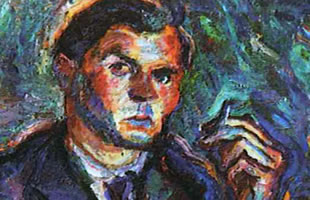
Michael Guttenbrunner (7 september 1919 – 12 mei 2004)
Portret door Marai Lassnig
De Amerikaanse schrijfster Margaret Landon werd geboren op 7 september 1903 in Somers, Wisconsin.Zie ook mijn blog van 7 september 2008 en ook mijn blog van 7 september 2009 en ook mijn blog van 7 september 2010.
Uit: Anna and the King of Siam
“She turned to him then, the deep brown eyes full of tears. “Dear Captain Orton, don’t belabor yourself so! To me you are a gentleman, a kind gentleman who has made this difficult trip endurable. But–please try to understand, that for me there has only ever been one man–Leon–and now that he’s–gone–there will never be anyone else.” She looked out across the water, but her eyes were unseeing. A tear ran down her cheek and she dried it hurriedly with a handkerchief. The man leaned on the rail beside her. “Mrs. Leonowens, you’re too young to bury your heart in a grave.” There was a note of pleading in his voice. “Believe me, I would not ask much. Just to take care of you, and Avis, and Louis.” She answered slowly, “But I can’t give even that little. I don’t know why, but I haven’t it left to give.” She lifted her face toward his and for a long moment he looked deeply into her eyes, then turned away scowling. Halfway down the deck he wheeled and came back. “I’ll be in port every month. If ever you need me, the Chow Phya and I are at your service.” And he was gone without waiting for a reply. The sun was hot now. Sighing, but a little reassured, the slight, graceful woman went below.”
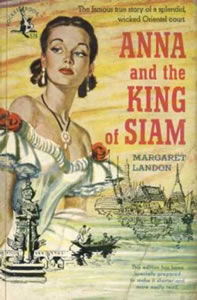
Margaret Landon (7 september 1903 – 4 december 1993)
Boekomslag
De Nederlandse schrijver Anton Haakman werd geboren op 7 september 1933 in Bussum. Zie ook mijn blog van 7 september 2008 en ook mijn blog van 7 september 2009 en ook mijn blog van 7 september 2010.
Uit: De grote Academie van Lagado
„Deel Drie van Gulliver’s Travels, ‘Een reis naar Laputa, Balnibarbi, Glubbdubdrib, Luggnagg en Japan’, is een allegaartje, een vergaarbak van ontdekkingen van uiteenlopende culturen, en wordt door de kritiek daarom niet hoog aangeslagen. Maar het wemelt er van de curieuze wetenschappelijke en utopische uitvindingen.
In dit deel wordt Jonathan Swifts ontdekkingsreiziger allereerst overvallen door een Hollandse zeerover, die hem wil vermoorden. Maar uiteindelijk belandt hij ergens aan wal. Na enige tijd ziet hij een groot, rond voorwerp naderen door de lucht. Het blijkt een zwevend eiland te zijn.
Hij wordt vanaf de kust opgehesen naar dat eiland, Laputa, waar zich het hof bevindt van de koning van het eiland Balnibarbi. Op Laputa wijdt de hofhouding zich uitsluitend aan wiskunde, astronomie en muziek, zonder oog of oor te hebben voor hetgeen zich in hun onmiddellijke nabijheid afspeelt. Ze zijn afwezig, absent minded. Buiten meetkunde en muziek nemen ze niets waar. Zelfs het voedsel is gesneden in driehoeken, parallellogrammen, cirkels, kegels, cylinders of heeft de vorm van muziekinstrumenten. Ze ontdekken – 150 jaar vóór Hall – dat Mars twee manen heeft en ze zijn doodsbenauwd voor kometen en voor de afkoeling van de zon, die dood en verderf zullen brengen.
Het eiland van de heerser zweeft over het grote Balnibarbi naar de hoofdstad Lagado, waar Gulliver toestemming krijgt om af te dalen. Ook hier staan geometrische vormen in hoog aanzien, maar in de praktijk van bijvoorbeeld de bouw brengt men er niet veel van terecht en is alles schots en scheef. De inwoners van Balnibarbi zijn uitermate onhandige theoretici, die veel meer belangstelling hebben voor de hemellichamen dan voor aardse zaken. Wel zijn ze heel druk in de weer met bezigheden die Gulliver aanvankelijk niet begrijpt – later blijken dat plannen te zijn, projecten.
Hij ontmoet een zonderlinge, conservatieve man, die hem uitlegt hoe dat gekomen is. Een jaar of veertig tevoren waren bepaalde personen gearriveerd vanuit Lagado om er alle kunsten, wetenschappen, talen en technieken te hervormen.“
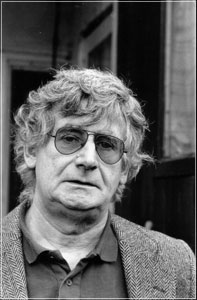
Anton Haakman (Bussum, 7 september 1933)
De Nederlandse dichter en schrijver Willem Bilderdijk werd geboren op 7 september 1756 in Amsterdam. Zie ook mijn blog van 7 september 2010 en eveneens alle tags voor Willem Bilderdijk op dit blog.
The Village Schoolmaster
There he sits; his figure and his rigid bearing
Let us know most clearly what is his ideal:–
Confidence in self, in his lofty standing;
Thereto add conceit in his own great value.
Certain, he can read–yes, and write and cipher;
In the almanac no star-group’s a stranger.
In the church he, faithful, leads the pious chorus;
Drums the catechism into young ones’ noddles.
Disputation to him’s half the joy of living;
Even though he’s beaten, he will not give over.
Watch him, when he talks, in how learned fashion!
Drags on every word, spares no play of muscle.
Ah, what pains he takes to forget no syllable–
Consonants and vowels rightly weighed and measured.
Often is he, too, of this and that a poet!
Every case declines with precisest conscience;
Knows the history of Church and State, together–
Every Churchly light,–of pedant-deeds the record.
All the village world speechless stands before him.
Asking ‘How can _one_ brain be so ruled by Wisdom?’
Sharply, too, he looks down on one’s transgressions.
‘Gainst his judgment stern, tears and prayers avail not.
He appears–one glance (from a god that glance comes!)
At a flash decides what the youngster’s fate is.
At his will a crowd runs, at his beck it parteth.
Doth he smile? all frolic; doth he frown–all cower.
By a tone he threatens, gives rewards, metes justice.
Absent though he be, every pupil dreads him,
For he sees, hears, knows, everything that’s doing.
On the urchin’s forehead he can see it written.
He divines who laughs, idles, yawns, or chatters,
Who plays tricks on others, or in prayer-time’s lazy.
With its shoots, the birch-rod lying there beside him
Knows how all misdeeds in a trice are settled.
Vertaald door E. Irenaeus Stevenson
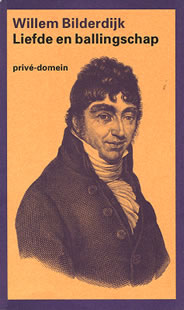
Willem Bilderdijk (7 september 1756 – 18 december 1831)
Boekomslag
De Duits – Israëlische dichteres en schrijfster Jenny Aloni (eig. Jenny Rosenbaum werd geboren op 7 september 1917 in Paderborn. Zie ook mijn blog van 7 september 2007 en ook mijn blog van 7 september 2009 en ook mijn blog van 7 september 2010
Versunken dunkle, harte Erde,
vergessen sommerlicher Tod.
Regen belebte gluterstarrte Samen,
Rote Kelche, weiße Sterne,
Tulpen und Narzissen schwimmen
auf grüner Winterflut.
Nur die Strünke meiner Zweifel
ragen steif und fahl
aus lichtgetränkten Blätterwogen.
Plötzlich
auf petrolbeflecktem Asphalt
neben meinem Fuß,
neben Gosse mit Säuren
lebendige Schnur,
grüngraue Schlange,
fremd auch sie
in Stadt voll Ruß
bedroht von Rädern und Menschen
sie und ich,
zum Brachland gehörig,
zu Gräsern und Büschen und Sumpf,
sie und ich
allein zwischen Häusern,
Zement und Gesichtern,
sie und ich,
gleiche Fremde, gleiche Einsamkeit,
gleiche Bedrohung und gleiche Angst
sie und ich.
Sie und ich und doch nicht wir.
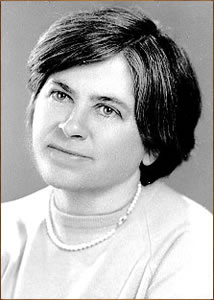
Jenny Aloni (7 september 1917 – 30 september 1993)
De Amerikaanse schrijver Henry Morton Robinsonwerd op 7 September 1898 in Boston, Massachusetts. Zie ook mijn blog van 7 september 2010
Uit: The Cardinal
“Only a few of the old purists remain. The whole business of Black and White is breaking up. But it won’t disappear entirely until the Roman question, involving the Pope’s temporal sovereignty, is settled. Meanwhile, I advise you to lay aside your New World notions. ‘When in Rome . . .’”
Stephen followed his mentor’s advice to the letter. By the end of the post-Lenten season Braggiotti had taken him, with the consent of his ecclesiastical superiors, to several dinner parties. The doors of the ancient palaces flew open to the handsome Roberto and his American friend. A valuable education in the social life of Rome ran parallel to Stephen’s schooling in Vatican diplomacy; his ear became attuned to the buzz of political surmise and ecclesiastic forecast rising from the salons of Black Society. He heard the usual rumours: that the royalist party of France would soon be crowning a Catholic king in Paris, and that Soviet agents were shipping vast numbers of hopeless cripples to the shrine at Lourdes with a view to discrediting its miracles. To top everything, he heard that Queen Wilhelmina was being prepared for conversion by a Carthusian confessor. Stephen’s common sense discounted such rumours, but, by tactfully avoiding any expression of opinion, he maintained a diplomatic tradition by no means peculiar to ecclesiastics. He watched Braggiotti and other members of the hierarchy maintaining a similar silence, and marveled at the drawing-room technique of cardinals who by a sibylline smile could at the same time confirm and deny some bit of Vatican gossip.
Women were of course present at these affairs.“
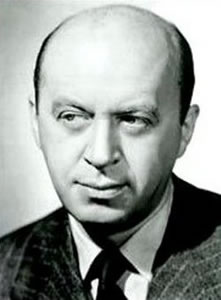
Henry Morton Robinson (7 september 1898 – 13 januari 1961)
